I'm not sure about southern Hesse specificially, but many of the states in southern Germany simply didn't want to join the new Confederation. The German history magazine "G — Geschichte" writes in an issue about Bismarck (issue of October 2010) on page 18
Deutschland und Frankreich — vier Jahre schon herrschte kalter Krieg zwischen ihnen. Das Königreich im Osten wurde immer mächtiger. Vorläufiger Höhepunkt war 1866 die Gründung des Norddeutschen Bundes. Nur die süddeutschen Staaten fehlen noch zur Einheit. Sie allerdings sperren sich mit Nachdruck. Verpreußung? Nein danke!
Which would translate to
Germany and France — for four years there's been a cold war between the two of them. The Kingdom in the east keeps growing more powerful. The preliminary apex was the foundation of the North German Federation in 1866. Only the southern German states were missing for unification. But those balked [at becoming members] emphatically. Prussification? No, thank you very much!
Because Bismarck (who was basically the driving force) didn't seek to unify the German states out of the kindness of his heart: He wanted to further Prussia's power. Accordingly, Prussia was the decisive power within the new federation. To quote the same magazine as above, from page 29:
Der Norddeutsche Bund ist Preußen — und umgekehrt.
The North German Federation is Prussia — and vice versa.
The constitution of the North German Federation made sure that no decision could be made against Prussia. There were some "Reservatrechte" (reserved rights) for some member states. For example Bavaria could still control its own postal service. But those were more decorative than of any actual impact.
It's probably understandable that the German states weren't too keen to enter that new federation, and some opted to stay out of it as long as they could.
So how would Bismarck go about getting them into his new empire, as well? He'd instigate a war against the old rival, France. For details, you might want to read up on the Ems Dispatch. After this telegram, either side felt gravely insulted by the other, and the French Empire basically had to declare war against the North German Federation to save face.
Another quote from the aforementioned magazine, this time page 21:
Die süddeutschen Staaten sind vertraglich verpflichtet, dem Norddeutschen Bund im Verteidigungsfall beizustehen. Aber selbst wenn sie es nicht wären, würden sie jetzt kämpfen. Denn nun fühlen sich alle nur noch als Deutsche, jetzt geht es gemeinsam gegen Frankreich!
The southern German states are contractually obligated to come to the North German Federation's aid in the case of defense. But even if they weren't obligated, now they would fight. Because now everybody sees themselves only as Germans, now we go together against France!
After the victory over France in the Franco-Prussian War of 1870, the southern states basically ran out of arguments against participating in a unified Germany. And this brings us to the Hall of Mirrors in Versaille, where the German Empire was officially proclaimed on January 18, 1871.
